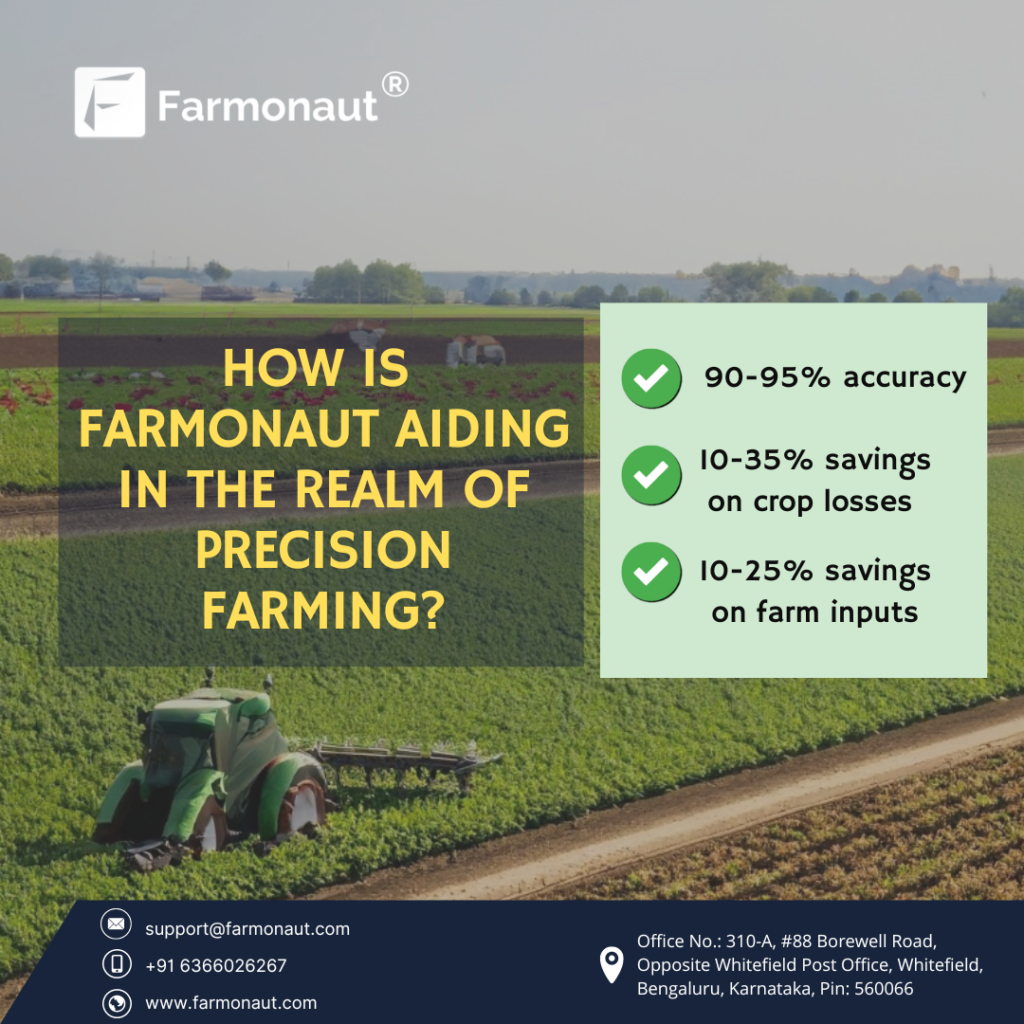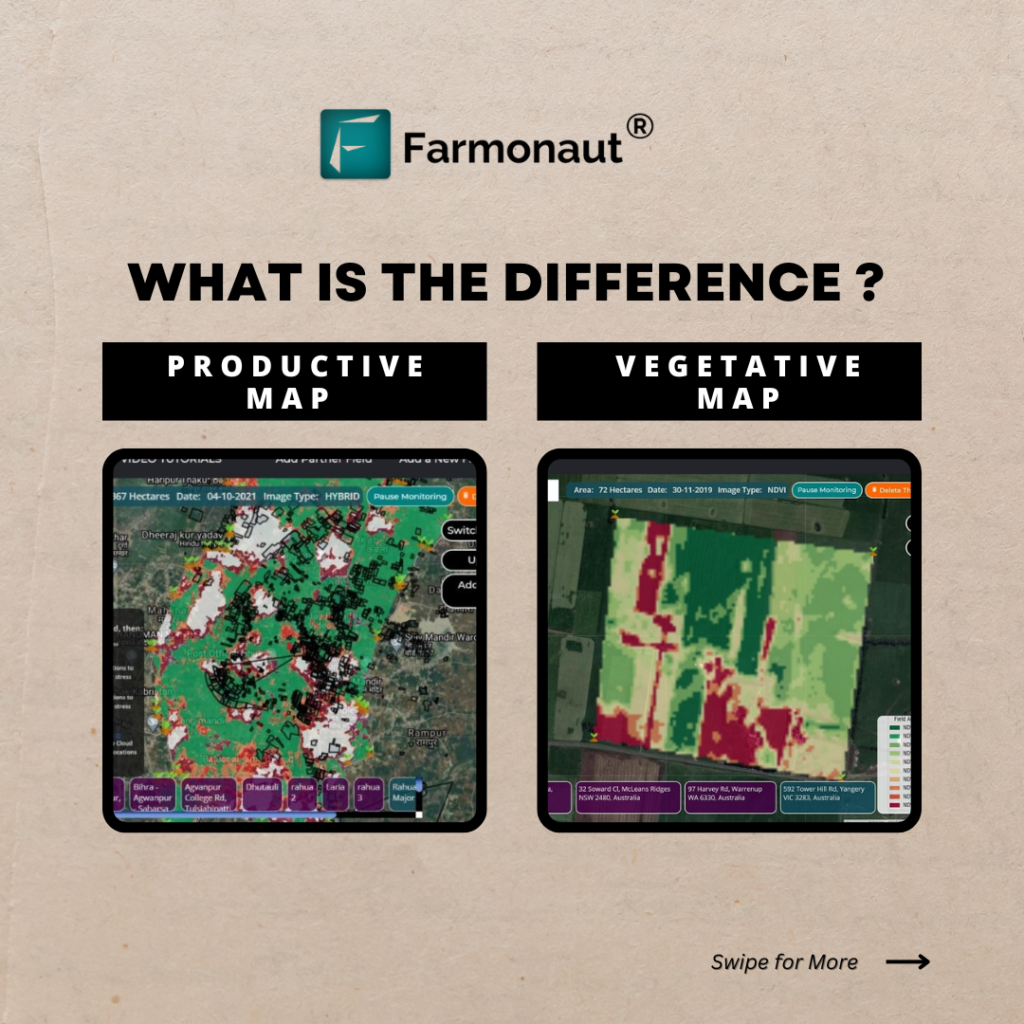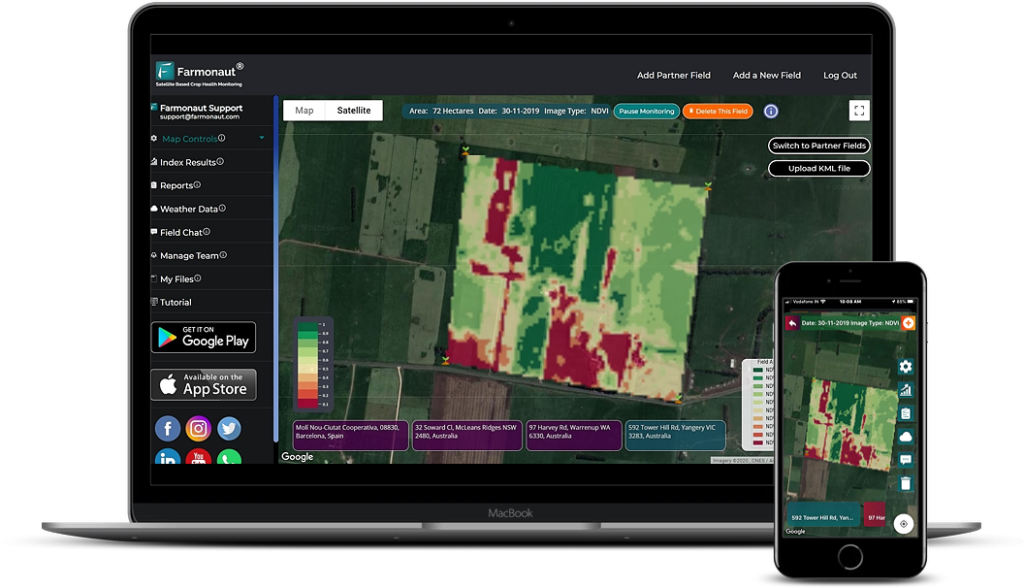Combating Aphids on Citrus: Effective Solutions for Orange and Lime Tree Infestations

Welcome to our comprehensive guide on dealing with aphids on citrus trees, specifically focusing on orange aphids and those affecting lime trees. As experts in agricultural technology and plant health, we at Farmonaut understand the significant challenges that citrus growers face when it comes to pest management. In this blog post, we’ll dive deep into the world of aphids on orange trees and aphids on lime trees, providing you with valuable insights and effective solutions to protect your citrus orchards.
Understanding Aphids and Their Impact on Citrus Trees
Aphids are small, soft-bodied insects that can wreak havoc on various plants, including citrus trees. These pests are particularly problematic for orange and lime trees, where they can cause significant damage if left unchecked. Let’s explore the specific challenges posed by aphids on orange trees and aphids on lime trees.
Aphids on Orange Trees
Orange tree aphids are a common pest that can severely impact the health and productivity of orange orchards. These tiny insects feed on the sap of orange trees, causing various issues such as:
- Leaf curling and distortion
- Stunted growth
- Reduced fruit quality
- Transmission of plant viruses
- Production of honeydew, which can lead to sooty mold growth
The presence of aphids on orange trees can be particularly concerning for commercial growers, as it can lead to significant economic losses if not addressed promptly and effectively.
Aphids on Lime Trees
Similarly, aphids on lime trees pose a substantial threat to lime orchards. These pests can cause damage similar to that seen on orange trees, including:
- Yellowing and curling of leaves
- Weakened tree vigor
- Reduced fruit size and quality
- Increased susceptibility to other pests and diseases
It’s crucial for lime growers to be vigilant and implement effective management strategies to control aphids on lime trees and maintain healthy, productive orchards.
Identifying Aphid Infestations in Citrus Trees
Early detection is key to managing aphids on orange trees and aphids on lime trees. Here are some signs to look out for:
- Visual Inspection: Regularly examine the undersides of leaves, young shoots, and fruit stems for clusters of small, pear-shaped insects.
- Leaf Damage: Look for curled, distorted, or yellowing leaves, which are common symptoms of aphid feeding.
- Honeydew Presence: Check for sticky residue on leaves and fruits, which is a telltale sign of aphid infestation.
- Ant Activity: An increase in ant populations around your citrus trees can indicate the presence of aphids, as ants are attracted to the honeydew produced by these pests.
- Sooty Mold: The presence of black, sooty mold on leaves and branches is often associated with aphid infestations.
Effective Management Strategies for Aphids on Citrus Trees
Now that we’ve identified the problem, let’s explore some effective strategies for managing aphids on orange trees and aphids on lime trees:
1. Cultural Control Methods
- Pruning: Regularly prune your citrus trees to improve air circulation and reduce hiding spots for aphids.
- Water Management: Avoid over-watering, as excess moisture can create favorable conditions for aphid populations to thrive.
- Nitrogen Management: Limit excessive nitrogen fertilization, which can promote tender new growth that attracts aphids.
- Weed Control: Keep the area around your citrus trees free of weeds, which can serve as alternative hosts for aphids.
2. Biological Control
Encouraging natural predators can be an effective way to control orange aphids and other citrus aphid species:
- Ladybugs: These beneficial insects are voracious aphid eaters and can help keep populations in check.
- Lacewings: Both adults and larvae feed on aphids, making them excellent biological control agents.
- Parasitic Wasps: These tiny wasps lay their eggs inside aphids, effectively controlling their populations.
- Hoverflies: The larvae of these flies are known to feed on aphids and other soft-bodied insects.
3. Organic Pest Control Solutions
For those seeking organic methods to combat aphids on orange trees and aphids on lime trees, consider the following options:
- Neem Oil: This natural insecticide can be effective against aphids while being safe for beneficial insects.
- Insecticidal Soaps: These products work by disrupting the cell membranes of soft-bodied insects like aphids.
- Horticultural Oils: These oils can smother aphids and their eggs, providing effective control.
- Garlic or Pepper Sprays: Homemade sprays using garlic or hot pepper can deter aphids from feeding on your citrus trees.
4. Chemical Control (as a last resort)
When other methods prove insufficient, chemical control may be necessary to manage severe infestations of orange tree aphids or aphids on lime trees:
- Systemic Insecticides: These products are absorbed by the tree and can provide long-lasting protection against aphids.
- Contact Insecticides: These chemicals kill aphids on contact but may require repeated applications.
- Growth Regulators: These products interfere with the aphids’ life cycle, preventing them from reaching maturity.
Note: Always follow label instructions and local regulations when using any chemical control methods.
Implementing an Integrated Pest Management (IPM) Approach
At Farmonaut, we strongly advocate for an Integrated Pest Management (IPM) approach when dealing with aphids on orange trees and aphids on lime trees. This holistic strategy combines various control methods to achieve long-term, sustainable pest management:
- Regular Monitoring: Implement a consistent monitoring program to detect aphid infestations early.
- Threshold-Based Action: Establish action thresholds to determine when intervention is necessary.
- Cultural Practices: Implement best practices in orchard management to create an environment less conducive to aphid infestations.
- Biological Control: Encourage and release natural predators to maintain a balanced ecosystem in your orchard.
- Chemical Control: Use targeted, selective pesticides only when necessary and as part of a broader management strategy.
- Record Keeping: Maintain detailed records of pest populations, control measures, and their effectiveness to inform future management decisions.
Leveraging Technology for Aphid Management in Citrus Orchards
At Farmonaut, we believe in harnessing the power of technology to enhance pest management strategies, including the control of aphids on orange trees and aphids on lime trees. Our satellite-based farm management solutions offer several advantages in the fight against citrus aphids:
1. Early Detection through Satellite Imagery
Our advanced satellite imaging technology can help detect early signs of stress in citrus trees, which may indicate the presence of pests like aphids. By identifying problem areas before they become visible to the naked eye, growers can take proactive measures to prevent the spread of orange aphids and other citrus pests.
2. Precision Agriculture for Targeted Treatments
Farmonaut’s precision agriculture tools allow for targeted application of pest control measures. By identifying specific areas of infestation, growers can apply treatments only where needed, reducing overall pesticide use and minimizing environmental impact.
3. AI-Powered Advisory System
Our Jeevn AI advisory system analyzes satellite data, weather patterns, and historical information to provide personalized recommendations for pest management. This can include optimal timing for aphid control measures and suggestions for integrated pest management strategies.
4. Real-time Monitoring and Alerts
With Farmonaut’s real-time monitoring capabilities, citrus growers can receive alerts about potential aphid outbreaks or conditions favorable for infestation. This allows for rapid response and implementation of control measures.
5. Data-Driven Decision Making
By collecting and analyzing data on aphid populations, treatment efficacy, and environmental factors, our system helps growers make informed decisions about pest management strategies for their citrus orchards.
Comparison: Farmonaut Satellite System vs. Drone and IoT-based Farm Monitoring
| Feature | Farmonaut Satellite System | Drone-based Monitoring | IoT-based Monitoring |
|---|---|---|---|
| Coverage Area | Large-scale (entire orchards) | Limited by flight time and regulations | Depends on sensor placement |
| Frequency of Data Collection | Regular intervals (e.g., weekly) | As needed, labor-intensive | Continuous, real-time |
| Cost-effectiveness | High (no hardware investment) | Moderate (equipment costs) | Variable (sensor costs) |
| Data Analysis | AI-powered, comprehensive | Requires separate analysis tools | Often limited to specific parameters |
| Ease of Use | User-friendly interface, no equipment to manage | Requires trained operators | Requires technical setup and maintenance |
| Weather Independence | Can operate in various weather conditions | Limited by weather conditions | Generally weather-independent |
| Scalability | Highly scalable to large areas | Limited scalability | Scalable but can be costly for large areas |
Best Practices for Long-term Aphid Management in Citrus Orchards
To ensure long-term success in managing aphids on orange trees and aphids on lime trees, consider implementing these best practices:
- Crop Rotation: While not always feasible for established orchards, rotating crops in nurseries or new plantings can help break the aphid life cycle.
- Resistant Varieties: Choose citrus varieties that show natural resistance to aphids when planting new trees or replacing old ones.
- Habitat Diversification: Create diverse habitats around your orchard to encourage natural predators of aphids.
- Sanitation: Regularly clean tools and equipment to prevent the spread of aphids between trees or orchards.
- Nutrient Management: Maintain balanced soil fertility to promote healthy tree growth and natural pest resistance.
- Water Management: Implement efficient irrigation practices to avoid creating conditions favorable for aphid populations.
- Continuous Education: Stay informed about the latest research and techniques in citrus aphid management.
The Role of Technology in Sustainable Aphid Management
At Farmonaut, we’re committed to helping citrus growers leverage cutting-edge technology for sustainable pest management, including the control of orange tree aphids and aphids on lime trees. Our satellite-based farm management solutions offer several advantages:
- Early Detection: Our advanced imaging technology can identify signs of stress in citrus trees before visible symptoms appear, allowing for proactive aphid control.
- Precision Application: By pinpointing affected areas, our system enables targeted treatment, reducing overall pesticide use.
- Data-Driven Decisions: Our AI-powered advisory system provides personalized recommendations based on real-time and historical data.
- Sustainable Practices: By optimizing resource use and minimizing chemical interventions, our technology supports environmentally friendly farming practices.
To learn more about how Farmonaut can help you manage aphids and other pests in your citrus orchard, visit our application page or explore our API documentation.
Case Studies: Successful Aphid Management in Citrus Orchards
While we don’t have specific case studies to share, we can highlight some general success stories from citrus growers who have effectively managed aphid infestations:
- Integrated Pest Management Success: Many growers have reported significant reductions in aphid populations and associated damage by implementing comprehensive IPM strategies.
- Biological Control Triumphs: Some orchards have successfully controlled aphids through the strategic release and encouragement of natural predators, reducing the need for chemical interventions.
- Technology-Driven Solutions: Growers using advanced monitoring systems, like those offered by Farmonaut, have reported earlier detection of aphid problems and more efficient use of control measures.
FAQs about Aphids on Citrus Trees
Here are some frequently asked questions about managing aphids on orange trees and aphids on lime trees:
- Q: How quickly can aphids damage my citrus trees?
A: Aphid populations can explode rapidly under favorable conditions, potentially causing noticeable damage within a few weeks if left unchecked. - Q: Are some citrus varieties more resistant to aphids than others?
A: Yes, some citrus varieties show greater natural resistance to aphids. Consult with local agricultural extension services for recommendations on resistant varieties suitable for your area. - Q: Can I use the same management strategies for aphids on orange and lime trees?
A: While many strategies are effective for both, it’s important to tailor your approach to the specific type of citrus and the particular aphid species you’re dealing with. - Q: How often should I monitor my citrus trees for aphids?
A: Regular monitoring is key. We recommend checking your trees at least weekly during the growing season and more frequently during periods of high aphid activity. - Q: Are systemic insecticides safe for use on fruit-bearing citrus trees?
A: Many systemic insecticides are approved for use on fruit-bearing trees, but it’s crucial to follow label instructions regarding application timing and pre-harvest intervals. - Q: Can aphids on my citrus trees spread to other plants in my garden?
A: Yes, some aphid species can move between different host plants. Maintaining overall garden health and implementing broad pest management strategies can help prevent this. - Q: How can Farmonaut’s technology help me manage aphids in my citrus orchard?
A: Our satellite-based monitoring system can detect early signs of stress in your trees, potentially indicating aphid infestations. Our AI advisory system can then provide tailored management recommendations based on this data.
Conclusion: A Holistic Approach to Aphid Management in Citrus Orchards
Managing aphids on orange trees and aphids on lime trees requires a comprehensive, integrated approach. By combining cultural practices, biological control, targeted interventions, and advanced technology, citrus growers can effectively protect their orchards from these persistent pests.
At Farmonaut, we’re committed to supporting citrus growers in their efforts to manage aphids and other pests sustainably. Our satellite-based farm management solutions provide valuable insights and data-driven recommendations to enhance your pest management strategies.
To explore how Farmonaut can help you protect your citrus orchard from aphids and other threats, visit our website or download our mobile app:
For developers interested in integrating our satellite and weather data into their own applications, check out our API documentation.
Remember, successful aphid management is an ongoing process that requires vigilance, adaptability, and a commitment to sustainable practices. By staying informed, leveraging technology, and implementing integrated pest management strategies, you can protect your citrus trees and ensure healthy, productive orchards for years to come.
Subscribe to Farmonaut
Ready to take your citrus orchard management to the next level? Subscribe to Farmonaut’s advanced farm management solutions:
By subscribing to Farmonaut, you’ll gain access to cutting-edge satellite monitoring, AI-powered insights, and personalized recommendations to help you manage aphids and other challenges in your citrus orchard more effectively. Join the future of precision agriculture today!













